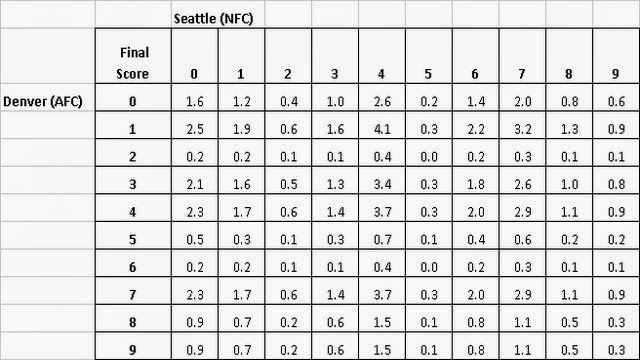Based on research with my colleague, Dr. Jay Granat - a psychotherapist and founder of StayInTheZone.com - we have analyzed factors related to sports psychology. Our series of articles is based on several decades worth of championship results (depending on the sport). Our work has predicted the winner of major sports championships at a 62% rate (sometimes picking underdogs) -- and is regularly featured in the New York Times.
Here is our analysis for the 2014 BCS game between Auburn and Florida State.
Defense
Our research shows that defense is more closely related to winning championships than a high-octane offense. In college football, the team with the better defense in terms of points scored has won 53.3% of championship games since the B.C.S. began fifteen years ago. Another key statistic has the team with the better defense – as measured by average yards yielded per rush – winning 71.4% of the games over the past 14 years (since the statistic is widely available).
In defensive points against, Florida State (10.7 points against / game) is ranked better than Auburn (24.0). Florida State also performed better than Auburn in defensive yards per rush. Florida State held opponents to 3.1 yards / rush versus Auburn’s 4.6 yards / rush. Edge: Florida State.
Consistency
Consistency is an important factor in winning championships across all sports. In both professional football and college football, average yards per rush is a good indicator of consistency and control of the game. The team with the better rushing statistic has won 57.1% of the championship games over the past 14 years. Auburn has run for 6.5 yards per rush, versus Florida State’s 5.7 yards per rush. Edge: Auburn.
Minimizing Errors
Minimizing mistakes is also crucial to winning the big game. Statistics show that teams which execute better during the regular season also perform well in championships. In both college and professional football, the team with fewer interceptions during the regular season has won a large majority of title games.
Over the past 15 years of college football, the team with fewer interceptions has won 60% of national championship games. Auburn threw 7 interceptions this year, while Florida State threw 13. Although Florida State passes much more than Auburn, Auburn’s interception rate is also better than Florida State. Edge: Auburn.
Big Game Experience & Coaching Leadership
Big game experience and coaching has a positive relationship with winning championships across all major U.S. sports. On average, these factors work out to about a 60% success rate in sports we studied. However, the experience factor, as measured by finals appearances over the past three years, posts just a 4-6 (40%) record since the B.C.S. began. Auburn won the B.C.S. Championship in 2010. Florida State has not made a championship final game over the past three years. Big game experience: Auburn.
Florida State coach Jimbo Fisher has a 3-0 record in major bowls, all with Florida State over the past three years. On the other hand, this is the first major bowl for Auburn coach Gus Malzahn. Coaching edge: Florida State.
Strength of Schedule
Some sports fans will point out differences in strength of schedule, or S.O.S. For example, Auburn played Alabama (ranked #1 at the time of the game), Missouri (#5), and a total of six teams ranked in the top 25 in compiling a 12-1 record. Florida State played Clemson (#3 at the time of the game) and four ranked teams during their 13-0 season.
Over the past 15 years, the team with the better strength of schedule, as measured by
SportsReference.com, has won 53.3% of championships. It is noteworthy that when the difference in S.O.S. has been greater than 3.0 during this 15 year period, the team with the tougher schedule has gone 4-0 in the championship. This year’s game features the widest S.O.S. spread since the B.C.S. began. Auburn has a S.O.S. of 6.62 versus Florida State’s -0.06.
Summary and Football Simulator
Our championship factors related to concepts of sports psychology, favor Auburn 3-2. In addition, we model football games based on certain random variables, statistics, and our championship factors. Our football simulator is a probabilistic Monte Carlo model, based on statistics from the regular season.
Based on our simulator, the final score that comes up most frequently is: Auburn 35 – Florida State 34.

